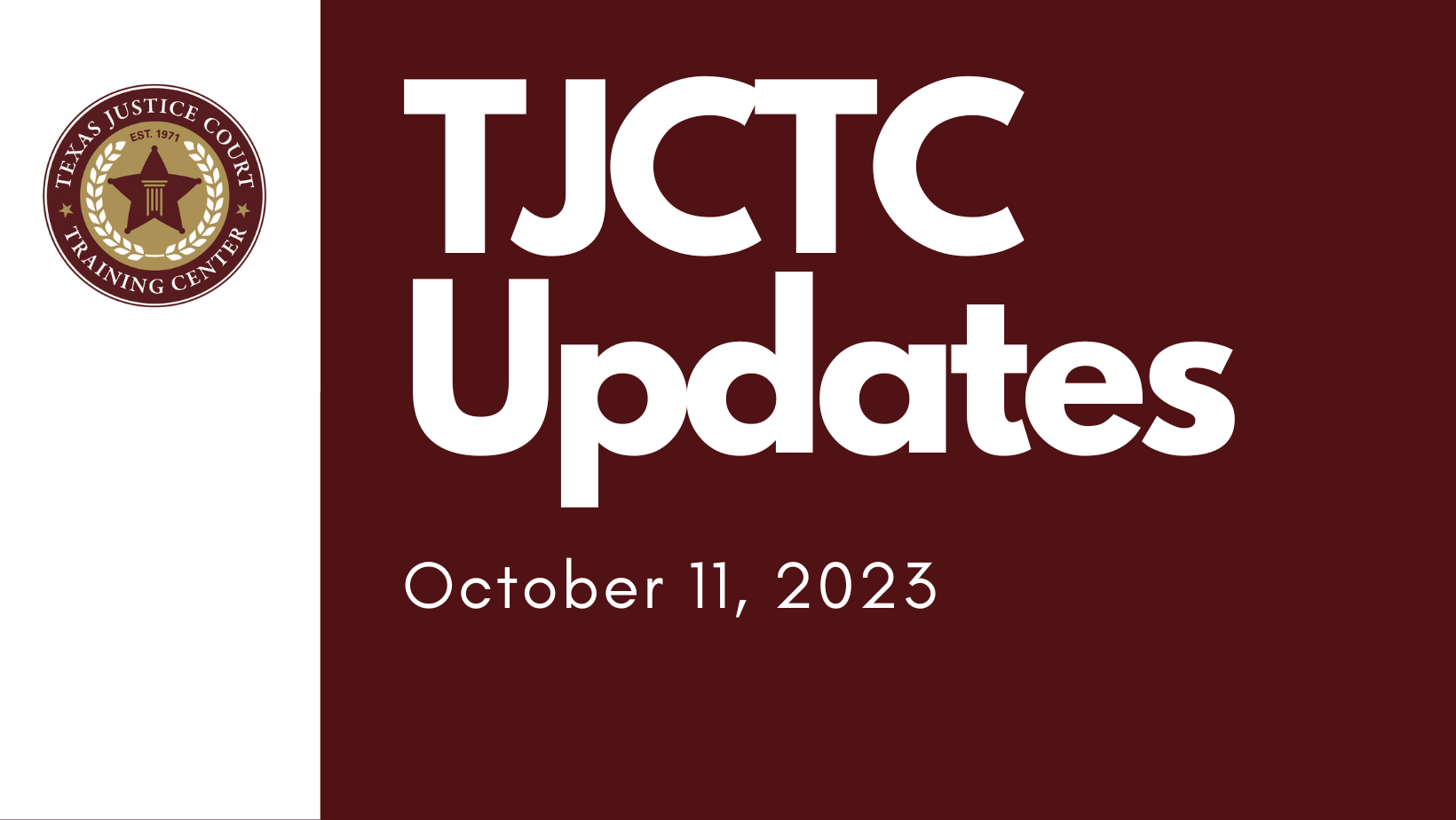
Good Afternoon Judges, Constables, & Court Staff,
It has been a while since we have sent out a legal update, so we have quite a few things to share. Below we discuss several hot legal topics, updated resources, new online content, and our most up-to-date legal question procedure, so make sure you scroll all the way to the bottom!
Hot Topics
Administrative Closure in Receivership
Many courts have received requests from a receiver to “administratively close” a receivership once a payment plan has been reached between the receiver and the debtor. There isn’t statutory authority to administratively close a receivership.
When a court receives a request like this, they may:
- do nothing and keep the receivership as is,
- extend the receivership,
- sign an order limiting or changing the receiver’s powers if they no longer need them to complete their duties, or
- end the receivership.
If a receivership is ended or expires and the debtor defaults on their payment plan, the judgment creditor can always seek the re-appointment of a receiver or utilize some other judgment enforcement tool.
TJCTC recommends that if a receivership is extended, the court keep regular check-ins as a requirement of the receiver, at least once every 180 days. These check-ins can easily be done by phone, Zoom, or email.
Often these requests come to court because the receiver is seeking payment of their fees, at least in part. Courts have the discretion to order receiver fees disbursed at any time during the receivership for work that has already been performed.
Enforcing Arbitration Awards
With the rise of virtual arbitration, courts are receiving more requests to enforce an arbitration award. We discuss the full process for handling these cases starting on page 73 of the Civil Deskbook. Please review this if you receive one of these requests.
Sometimes arbitrations are conducted by large national arbitration companies, so the packets they provide may seem strange, as they cite the Federal Arbitration Act instead of the Texas Arbitration Act. However, in the cases we have discussed with judges, they are still properly filed here, because the arbitration took place here in Texas (the parties were here when they logged onto the arbitration).
HB 3956 – DNA Samples
This bill requires law enforcement to collect DNA samples from any defendant arrested for a felony offense during the booking process. This might affect judges who magistrate, because if a defendant refuses or for some reason a sample is not collected, Code of Criminal Procedure Art. 17.47 requires this to be listed as a condition of bond for felony offenses.
Updated Resources
You may have already noticed, but the updated Deskbooks are being posted. Please be patient while we finish the last few updates and work diligently to update the forms, charts, checklists, and other resources.
*New* Interpreters & Spanish Terminology Self-Paced Module
We just posted a brand-new module that covers legal issues related to interpreters, including help for appointing interpreters, a Spanish/English legal glossary, and more! Judges and court staff can get 3 hours of credit for completing the module. Constables and their staff may also find this module to be a good resource when dealing with persons with limited English proficiency or language skills.
*New* Juvenile Criminal Diversions Webinar
This webinar will discuss the details of the new Juvenile Diversion procedures as well as leave time for your questions. Please join us on Monday, October 30, 2023 at 2:00 pm on Zoom. Registration will open soon, and you should receive an email.
Legal Question Procedure
The legal department at TJCTC is happy to assist you with your legal questions, and we want to remind you of the best procedure to get your questions answered as quickly as possible. We know in the recent past we have had some phone issues, but now that should be all cleared up!
You have two options:
- One of the attorneys will be answering legal questions from 9:00 am – noon and 1:30 – 3:00 pm daily when we are not traveling to or teaching at a program. You can reach them by dialing 512-347-9927 and pressing 1 when asked for an extension. Note, often you may have to leave a voicemail and wait for a call back, because we are either on another call or at a program. Please note that missed calls without voicemails will not be returned.
- Post your question to the legal board. Within 5 business days (often sooner) one of the attorneys will post the answer to your question.
FAQ:
Can’t I just call my favorite attorney?
No. Any legal question voicemails or calls will be forwarded to the attorney on call. This is to ensure that we have someone answering calls each week and the other attorneys can work on resources, materials, and classes for the upcoming programs.
Can I just send an email?
No. Emails with legal calls will receive a reply asking you to post on the legal board or call the legal line for the same reasons listed above.
Thank you so much for your time and attention! The TJCTC team is looking forward to another great year with all of our court staff, constables, and justices of the peace. Note, these new update emails will be saved to the TJCTC Blog, The Docket, so you can access them anytime.
All the Best,
Thea & the TJCTC Team





